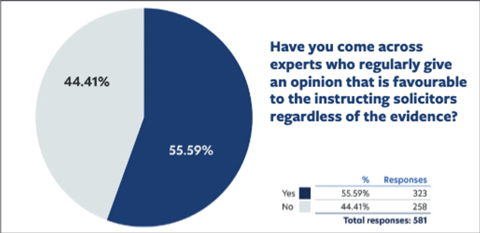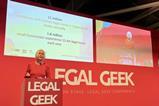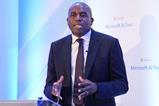The Expert Witness Survey 2023 dwells on a raft of issues inhibiting an expert’s independence, including solicitors commonly putting them under pressure to come up with a favourable opinion
Experts and solicitors must have a close professional relationship to work together effectively where issues in dispute need expert opinion, notes Mark Solon, of Bond Solon and Wilmington Legal, in his foreword to The Expert Witness Survey 2023.
Among many other questions, this year’s survey considers situations where things go wrong in this regard – including where an expert’s independence is at risk of being compromised. Although an expert is paid by the instructing party, their duty remains to the court under procedure rules.
Of 581 expert witnesses who responded (see graphic), more than half have encountered experts who regularly give an opinion that is favourable to the instructing solicitors regardless of the evidence. This should be a matter for scrutiny by the courts and all court users, the report suggests.
Arksey v Cambridge University Hospitals NHS Foundation Trust [2019] EWHC 1276 (QB) is cited as evidence that ‘partisanship will be exposed’. In that case, the judge described the expert’s evidence as falling ‘far below’ expected standards.
Four out of 10 respondents said they have encountered solicitors who only instruct experts who will give favourable opinions.
'A more prudent solution would be for an expert to demonstrate their independence through their own evidence-based reasoning, which will assist in exposing the partisan approach of their counterpart'
The Expert Witness Survey 2023
Where another expert witness produces an improperly biased opinion – or where a witness becomes aware of, or suspects, opposing solicitors are impeding a counterpart’s duty to be independent – clear majorities of respondents believe there should be a formal duty to inform their own instructing solicitors and the court.
But the 2023 report adds a caveat: ‘If a formal duty exists for experts to inform the court directly, there is a risk that they may be drawn too close into the battle of litigation, and therefore compromise their own impartiality. Perhaps, instead, a more prudent solution would be for an expert to demonstrate their independence through their own evidence-based reasoning, which will assist in exposing the partisan approach of their counterpart.’
Some experts have complained of being ‘bullied’ and ‘intimidated’ by instructing solicitors to alter their opinions before finalising reports or joint statements. Nearly half of respondents have experienced solicitors making ‘suggestions’ about the content of their report that have a ‘subtext of pressure’ to produce a favourable opinion.
This year’s survey again reflects on instances where experts are instructed to give evidence in emotionally challenging, highly controversial and sometimes potentially dangerous cases. It cites the nine-month Lucy Letby trial, in which a consultant paediatrician who acted as expert witness described the experience as ‘long and harrowing’.

Some 83% of respondents said judges should be more willing to order that an expert witness be given anonymity in highly controversial or criminal cases. Most think anonymity provides sufficient protection; but 22% suggested additional measures should be considered by the courts, such as police protection, conducting a proper risk analysis and private, virtual hearings.
Anyone can call themselves an expert and last year’s report reflected on the lack of a legal definition. This time the survey probes what this might mean for regulation. Some 79% of respondents believe experts should be registered with a recognised professional body and hold a current membership/registration with them.
Experts are fairly evenly split, however, on an additional or separate overarching regulator of expert witnesses in the justice system. Just 46% are in favour and 54% opposed.
Remaining questions consider fee rates and trends, and the use by expert witnesses of artificial intelligence. Excluding medical, average hourly fees by specialism range from £405 (animals) at the top to £75 at the bottom (international law/noise and vibration) – though a sole expert in translation/interpretation commands just £25.
In medical the average rate is £165, with ear, nose and throat the highest at £279.
Just 30% of experts overall have increased their hourly rate on a year ago, with nearly two-thirds charging the same.
One respondent said: ‘Solicitors need to accept that the more complex the case and thus the number of enclosures, that the fee will be higher. On occasion I am told that they would like to instruct me, but another expert has quoted a lower fee. Here I will explain that if this is the case they need to instruct the other expert. I will not compromise the quality of my report to adhere to the number of hours quoted.’
Another complained: ‘Recovering fees from solicitors, CPS and courts is a nightmare. Fees should be paid before providing the report.’
AI has yet to permeate the sector to any significant degree. Only 8% have so far used AI in producing reports and 70% said they have no intention of doing so, citing lack of knowledge of and trust in AI.
- Produced in collaboration with the Law Society Gazette, the survey can be read in full here




































1 Reader's comment